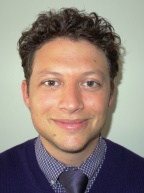Medical Student Portal »
People »
Instructors »
Department of Surgery at SFVAMC »
Quan-Yang Duh, M.D.
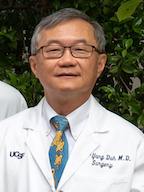
Quan-Yang Duh, M.D.
- Professor of Surgery
- Division of Surgical Oncology
- Chief, Section of Endocrine Surgery
Contact Information
Mt. Zion Medical Center
1600 Divisadero St, Room B612 (Campus Box 1932)
San Francisco, CA 94115
Phone: 415-885-7616
Fax: 415-885-7617
[email protected]
VAMC Surgical Services
Voice: (415) 750-2131
Fax: (415) 514-1133
1600 Divisadero St, Room B612 (Campus Box 1932)
San Francisco, CA 94115
Phone: 415-885-7616
Fax: 415-885-7617
[email protected]
VAMC Surgical Services
Voice: (415) 750-2131
Fax: (415) 514-1133
Education
-
1973-77, Yale University, New Haven, CT, B.S., Molecular Biophysics & Biochemistry
- 1977-81, University of California, San Francisco, M.D., Medicine
Residencies
- 1981-82, University of California, San Francisco, Intern, General Surgery
- 1982-88, University of California, San Francisco, Resident, General Surgery
Fellowships
- 1981-82, University of California, San Francisco, Postdoctoral Fellow, Surgery, General
- 1982-88, University of California, San Francisco, Postdoctoral Fellow, Surgery, General
Clinical Expertise
- Adrenal Tumors
- Adrenocortical Carcinoma
- Conn's Syndrome
- Cushing's Syndrome
- Hyperparathyroidism
- Hyperthyroidism
- Laparoscopic Adrenalectomy
- Laparoscopic Hernia Repair
- Laparoscopic Parathyroidectomy
- Laparoscopic Thyroidectomy
- Multinodular Goiter
- Neuroendocrine (Islet Cell) Tumors
- Pheochromocytoma
- Thyroid Cancer
- Thyroid Nodules
Biography
Dr. Quan-Yang Duh is Professor and Chief of Endocrine Surgery and Associate Director of Advanced Videoscopic Surgery Center at UCSF. He is an attending Surgeon at both UCSF Medical Center and San Francisco VA Medical Center. He is also fluent in Mandarin and Taiwanese.
Dr. Duh specializes in surgery to treat tumors of the thyroid, parathyroid and adrenal glands, as well as endocrine and gastrointestinal malignancies. He is nationally and internationally recognized for his expertise in complex minimally invasive procedures including laparoscopic adrenalectomy, thyroidectomy, parathyroidectomy and hernia repair.
Dr. Duh graduated from Yale University, New Haven, CT with a B.S. in Molecular Biophysics and Biochemistry. He completed his surgical internship, residency and postdoctoral fellowship at the University of California, in San Francisco. He is the past president of the American Association of Endocrine Surgeons and the San Francisco Surgical Society, as well as president of the American College of Surgeons' Northern California Chapter. Highly respected by his peers, Dr. Duh was named to the list of U.S. News "America's Top Doctors," a distinction reserved for the top 1% of physicians in the nation for a given specialty.
Research Overview
Dr. Duh's research in endocrine cancer involved oncogenesis, genetic alteration and redifferentiation treatment of thyroid cancer and adrenal tumors. His clinical research involved patients with adrenal diseases (aldosteronoma, pheochromocytoma, Cushing, incidentaloma and adrenal metastasis), and minimally invasive parathyroid and thyroid operations.
Dr. Duh has developed and actively teaches several new techniques for advance laparoscopic surgery. He has authored or co-authored more than 250 articles and textbook chapters on topics of endocrine surgery and laparoscopic surgery. Dr. Duh was the Site Principal Investigator for a multi-center Veterans Affairs Medical Center prospective randomized trail of open mesh versus laparoscopic inguinal hernia repair, the results of which was published in New England Journal of Medicine. He has started the program in robot-assisted laparoscopic general surgery at the VA Medical Center, currently focused on inguinal hernias.
Clinical Trials
Data provided by UCSF Profiles, powered by CTSI
- Study ID: NCT05152927Start Date: Dec 2021Estimated Completion Date: Dec 2024Condition(s): Parathyroid Diseases, Parathyroid Dysfunction, Parathyroid Neoplasms, Parathyroid Adenoma, Hypercalcemia, Neoplasms, Glandular and Epithelial, Endocrine Gland Tumor, Adenoma, Hyperparathyroidism, Primary Hyperparathyroidism
Publications
MOST RECENT PUBLICATIONS FROM A TOTAL OF 432
Data provided by UCSF Profiles, powered by CTSI
- Ullmann TM, Mulder M, Davis S, Rajwani T, Khanafshar E, Duh QY. Somatic and Germline Mutations in Atypical Parathyroid Tumors. JAMA Otolaryngol Head Neck Surg. 2023 Oct 01; 149(10):942-943. View in PubMed
- Beninato T, Duh QY, Long KL, Kiernan CM, Miller BS, Patel S, Randle RW, Wachtel H, Zanocco KA, Zern NK, Drake FT. Challenges and controversies in adrenal surgery: A practical approach. Curr Probl Surg. 2023 Sep; 60(9):101374. View in PubMed
- Mulder MB, Duh QY. Magic Pen?-An Innovative Adjunct for Intraoperative Identification of Parathyroid Glands. JAMA Surg. 2023 Oct 01; 158(10):1059-1060. View in PubMed
- Mulder MB, Duh QY. Reflecting on Thirty Years of Experience With Active Surveillance for Papillary Thyroid Microcarcinoma. J Endocr Soc. 2023 Aug 02; 7(9):bvad105. View in PubMed
- Silver Karcioglu AL, Triponez F, Solórzano CC, Iwata AJ, Abdelhamid Ahmed AH, Almquist M, Angelos P, Benmiloud F, Berber E, Bergenfelz A, Cha J, Colaianni CA, Davies L, Duh QY, Hartl D, Kandil E, Kim WW, Kopp PA, Liddy W, Mahadevan-Jansen A, Lee KD, Mannstadt M, McMullen CP, Shonka DC, Shin JJ, Singer MC, Slough CM, Stack BC, Tearney G, Thomas G, Tolley N, Vidal-Fortuny J, Randolph GW. Emerging Imaging Technologies for Parathyroid Gland Identification and Vascular Assessment in Thyroid Surgery: A Review From the American Head and Neck Society Endocrine Surgery Section. JAMA Otolaryngol Head Neck Surg. 2023 03 01; 149(3):253-260. View in PubMed
- View All Publications
In the News
- Department of Surgery - Alexi Callen - April 08, 2021The UCSF Department of Surgery has extended journal clubs to the virtual world. All fourth-year medical students are welcome to participate. The goal is to offer medical students applying for sub-internship programs a glimpse of the Department of Surgery's innovative academic profile, despite limited travel during the pandemic. Virtual journal clubs will be held every two months. Discussions will be led by UCSF faculty, fellows and residents from various surgical subspecialties and will [...]
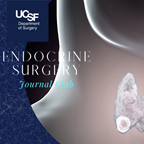
- UCSF Endocrine Surgery - Richard Barg - June 19, 2019UCSF Endocrine surgeon Quan-Yang Duh, M.D. was awarded the Oliver Cope Meritorious Achievement Award from the American Association of Endocrine Surgeons (AAES). The ceremony took place at the organization's annual meeting on April 7, 2019. The Cope award is highest honor given by the AAES and has been awarded only nine times in its history. The award was presented to Dr. Duh by another luminary in the field, Orlo Clark, M.D., professor emeritus of surgery at UCSF, and widely recognized [...]
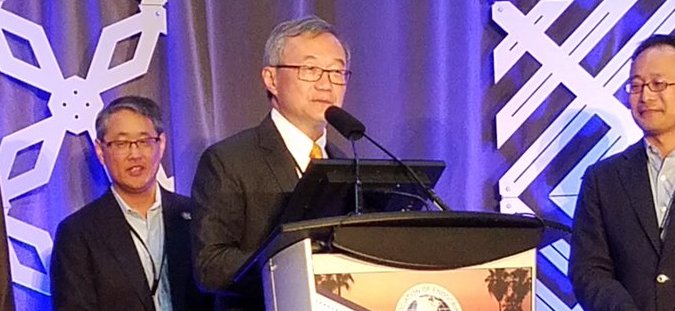
- UCSF News Services - Shelley Wong - June 13, 2019Researcher of the Month: Peter Stock, MD, PhD As a pivotal figure in HIV-to-HIV organ transplantation and its legalization through the passage of the HIV Organ Policy Equity (HOPE) Act, transplant surgeon Peter G. Stock, MD., PhD., continues to strive toward breakthroughs in research. While Stock is mostly known for his HIV transplantation work, he has been investigating pancreatic islet transplantation (also known as beta cell replacement) to cure type 1 diabetes since his days as a PhD [...]
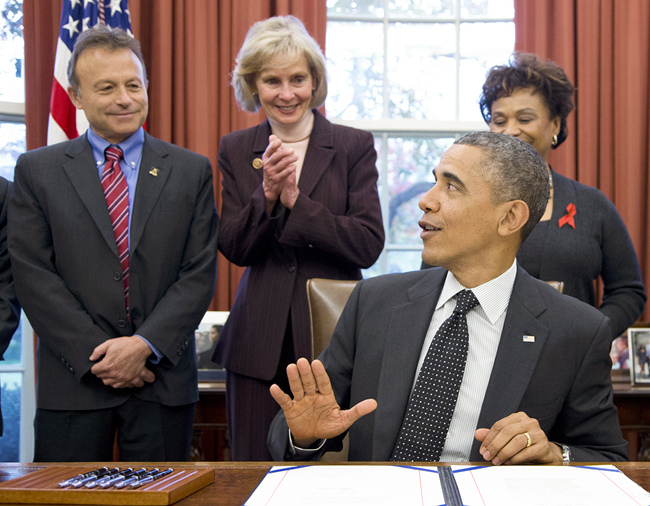
- UCSF News Services - Robin Marks - April 16, 2019Treating the overproduction of one hormone may be a way to help a subset of the millions of Americans who suffer from obstructive sleep apnea, according to a new study. People with obstructive sleep apnea stop breathing for short periods while they are sleeping, which leads to a poor night's sleep and debilitating fatigue during the day. Most people with the condition need to use dental devices or CPAP (continuous positive airway pressure) machines to sleep at night. But researchers at UC San [...]

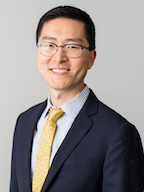
- UCSF Endocrine Surgery - Richard Barg - December 07, 20182018 AAS TrailblazerAward - Curated tweets by UCSFSurgery
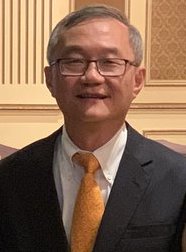
Quan-Yang Duh, MD Recounts Iconic Immigrant Journey in Address to Pacific Coast Surgical Association
UCSF Endocrine Surgery - Richard Barg - February 28, 2018Quan-Yang Duh M.D., professor and chief of the section of endocrine surgery at University of California, San Francisco (UCSF) and outgoing President of the Pacific Coast Surgical Association, told a rapt audience of attendees at the organization's annual meeting of his journey as an immigrant, his rescue by a Greek family in 1971, and his work as endocrine surgeon, encapsulated in an inspirational story spanning multiple cultures. Dr. Duh was warmly introduced by fellow UCSF endocrine surgeon [...]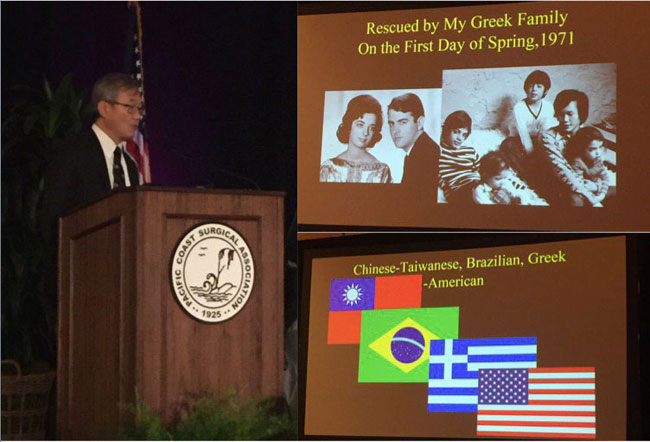
- UCSF Endocrine Surgery - Richard Barg - December 20, 2017Quan-Yang Duh M.D., professor and chief of endocrine surgery at UCSF, and a nationally and internationally recognized leader in the field, is the recipient of the 2017 Paul Starr Award from the American Thyroid Association (ATA). The Paul Starr Award Lecture recognizes an outstanding contributor to clinical thyroidology. Dr. Duh delivered the 2017 lecture for this award entitled, "Technical and Technological Advances that Changed Thyroid Surgery" on October 20th at the ATA annual meeting in [...]

- UCSF Endocrine Surgery - Richard Barg - April 07, 2016James Fallows, national correspondent for The Atlantic, recently wrote about the death of comedian Garry Shandling, noting that he suffered from hyperparathyroidism, a condition that, if left untreated, can raise the risk of having a heart attack and other serious medical conditions. Fallows' piece was both personal and educational, laying out the hazards of delaying treatment, as he himself did by putting off surgery for many years. Fallows ultimately consulted with Quan-Yang Duh [...]

- UCSF Endocrine Surgery - Richard Barg - October 01, 2015MedicalResearch.com recently interviewed Quan-Yang Duh M.D. (pictured first), Chief of the Section of Endocrine Surgery, Division of General Surgery, at UCSF, on the differences in etiology of unilateral vs. bilateral incidentalomas. What we found in our study was that although the possible subclinical diseases were the same – hypercortisolism and pheochromocytoma, the probabilities were different. The patients with bilateral incidentalomas were more likely to have subclinical Cushing's [...]
